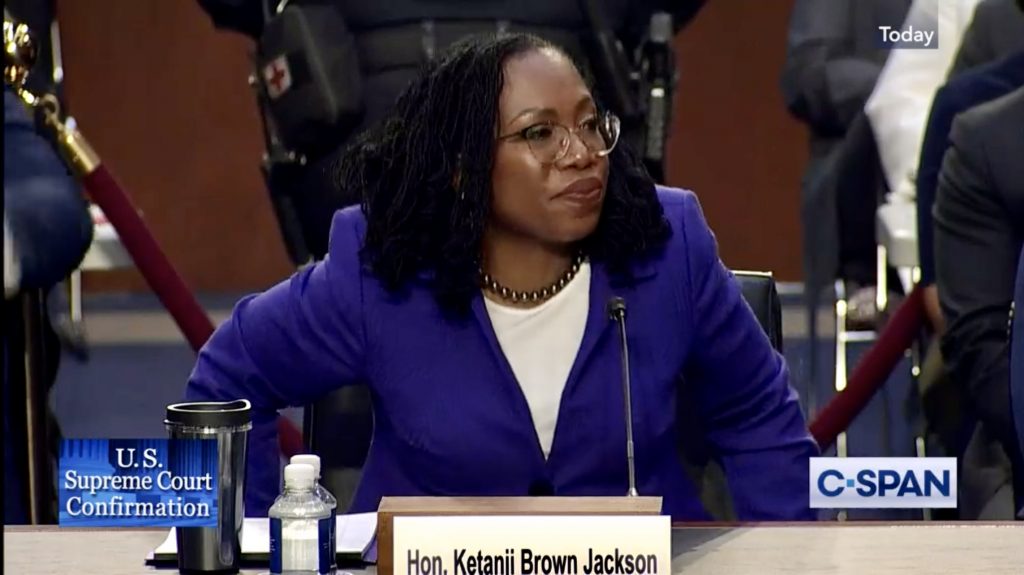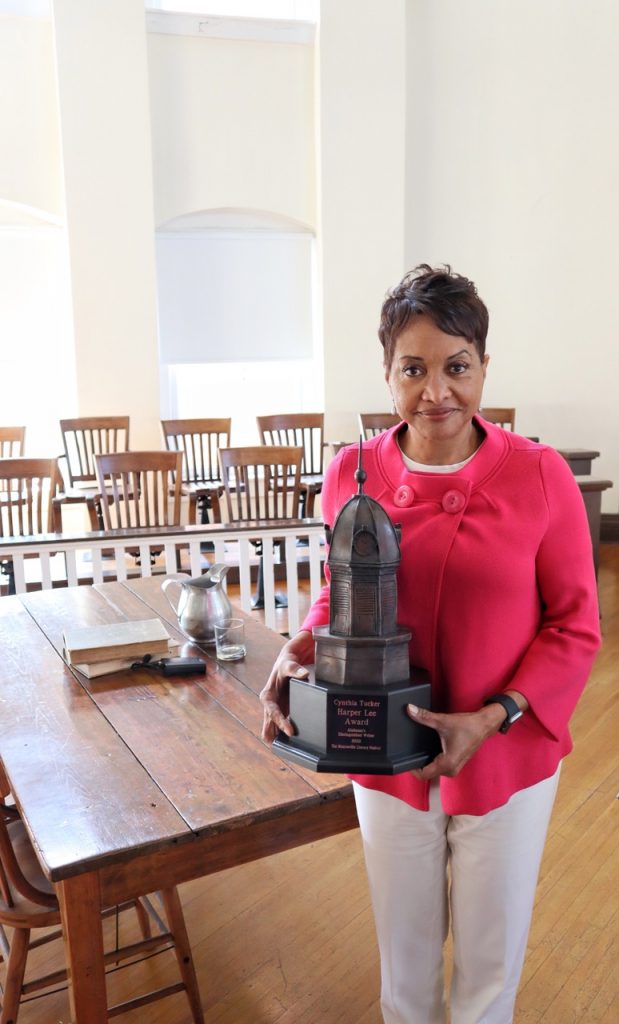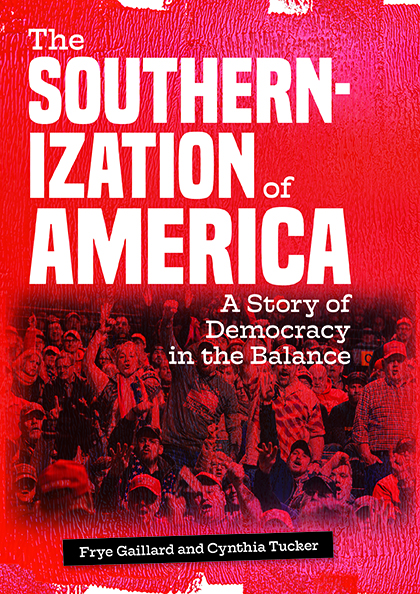‘We’re In For a Disturbing Fight’: Cynthia Tucker on ‘The Southernization of America’ and Our Democracy in the Balance
On Wednesday night at 7, Cynthia Tucker, the former Atlanta Journal-Constitution editorial page editor returns to town with co-author and current University of South Alabama colleague Frye Gaillard to discuss their new book “The Southernization of America: A Story of Democracy in the Balance” (NewSouth Books, $25.95) at the Atlanta History Center in Buckhead.
The thought-provoking and at times, troubling tome is a follow-up to John Egerton’s 1974 book “The Americanization of Dixie: The Southernization of America.” The premise of Egerton’s original sociological dig into the South’s psyche? With progressive leaders like Jimmy Carter gaining power, Egerton posited that the region’s dark cloud of lynchings, slavery, and segregation might finally be lifting.
Tucker and Gaillard’s sobering follow-up set 50 years later, traces the 60-year effectiveness of Richard Nixon’s Southern Strategy and the rise of Ronald Reagan to the emergence of U.S. House Speaker Newt Gingrich and ultimately, the seeming intractability of today’s Trumpism. In short, Gaillard and Tucker’s book could give many progressives sleepless nights (and a few nightmares) as they focus on this fall’s mid-term elections. Both authors grew up in Alabama but as Tucker points out, “on opposite sides of the color line.” In the pages of “Southernization,” Gaillard, a white journalist who has been writing and reporting on race for half a century now (including a memoir “Lessons From the Big House: Our Family’s Passage Through the History of the South” about his family’s painful history as plantation and slave owners) and Tucker, a Black Pulitzer Prize-winning political columnist and National Association of Black Journalists hall of fame member, complement each other brilliantly. Explains Tucker: “While we come from different places, we discovered we had ended up in a very similar place with our political perspectives.”
In advance of their book signing and discussion Wednesday, night, my former AJC colleague spoke to me about their fascinating — and frightening — new book. The following is an edited transcript of our conversation.
Eldredge: “The Americanization of Dixie: The Southernization of America” was first published in 1974 and today, it feels very much like a book of its time and possibly, also a little bit too optimistic?
Tucker: Egerton’s book was published in 1974 at a time when, in some ways, the South seemed to be moving in the right direction. Jimmy Carter had been elected governor of Georgia. Reubin Askew had been elected governor of Florida. They were both men who understood the South’s history as the epicenter of racism and they understood that the South needed to move away from that. Egerton speaks to that in the book. But Egerton also saw, particularly when George Wallace ran for the presidency, the Northeast and the Midwest seemed to embrace that racism more explicitly. Egerton was worried about that. We follow up 50 years later and as Egerton did not know how things would end up, neither do we.
Eldredge: You place a lot of responsibility for where we are right now politically at the feet of the former Speaker of the House from Georgia, Newt Gingrich, writing “he left his awful mark on American politics.” Even now, we see Gingrich attempting to insert himself into the David Perdue gubernatorial race, The Herschel Walker Senate campaign and attending Donald Trump’s rallies. Is this just an old guy seeking relevance or something else?
Tucker: I do think Newt Gingrich is an old guy trying to stay relevant. Although I never want to underestimate him. Because Gingrich has left politics, because he’s not on the scene much anymore, I don’t think he gets either enough of the credit or blame for the malicious strain that he left on our politics. We talk about the awful influence of Fox News a lot but we don’t talk about Gingrich enough. And Gingrich very literally taught his Republican colleagues to talk about Democrats as if they were the enemy, using words like “traitor” to describe them and their policies. He also discouraged Republican congressmen from moving their families to Washington. This was almost sociopathic. Why did he discourage this? Because if they moved their families to Washington, they would spend more time there and naturally, they would spend leisure time with their Democratic colleagues. They might come to like them and become friends. Their children might go to school together. Gingrich did not want that. He wanted his colleagues to dislike and distrust the Democrats across the aisle. And that strain has only grown worse over the decades. Of course, Gingrich quit when he could no longer be king, the Speaker of the House. But that seed he planted, grew into this awful, unwholesome harvest. And I don’t think we know how to root it out.
Eldredge: Another thing the book underscores is that Gingrich helped to create the Trump playbook.
Tucker: Absolutely. Trump had a natural gift for the con. Gingrich is nothing but a grifter himself, a political one. Gingrich had already laid the foundation for this so when Trump came along, many Republicans weren’t as skeptical as they should have been and might have been. Gingrich, of course, welcomed Trump into the club.
Eldredge: You grew up in Monroeville, Alabama and I learned something new about you reading this book that I was unaware of when we were working together at the AJC, back when you were writing about the Georgia flag in the late 1990s. You write in “Southernization,” “I was told I didn’t understand the South even though I’m as Southern as gravy on biscuits.” You had to confront these people who were pushing this revisionist history about slaves fighting for the Confederacy. You had a unique response to that.
Tucker: One of my side duties as the AJC’s Editorial Page Editor was a lot of public speaking. I was often invited to speak on panels where there was a discussion about changing the flag or Confederate history. That’s where I would encounter a lot of this revisionism. I remember one panel when I was told I couldn’t really understand the South. And this business about slaves fighting for the Confederacy came up a lot. I had read books by these thoughtful historians about the Civil War and about slave revolts and had learned that Black men were not allowed to enlist in the Confederacy. It was against the law. So I always said to them, “Show me a picture of a Black man in a Confederate uniform holding a rifle.” That simply had not happened so I usually got these stunned looks. I don’t think they had thought it through that far.

Eldredge: One thing you write about in the book is how Trump defied his closest advisors and his party by continuing to object to the renaming of these Confederate military bases, saying “Trump chose to walk boldly backwards to a time when white supremacy was an accepted pillar of American culture.” Why do you think that was so important to him?
Tucker: I remain baffled by it. I don’t know why it was so important to Trump. I do know that his family was engaged in racist practices in their real estate business. They got sued for discrimination. I can only assume then that Trump grew up in a household where racism was in the air. Those racist practices didn’t come out of nowhere. Trump’s affinity for the Confederacy, though, went against the recommendations of his own military officers, is something else again. You even had Southern Republicans like [former South Carolina governor] Nikki Haley saying we need to get away from this. I will say this — Trump had and still has this incredible political savvy for what sells to certain constituents.
Eldredge: While critical race theory is covered in the book, there’s been one significant development since you went to press — the confirmation of U.S. Supreme Court Justice Ketanji Brown Jackson and how, during her confirmation hearings, some conservative senators spent their time asking her about CRT. I don’t suppose that’s a coincidence?

Tucker: No, it’s not. It had nothing to do with cases that might come before the Supreme Court. Although, I suspect some of these laws banning so-called critical race theory will end up before federal courts because they’re so ridiculous and broad. It’s clear that people like [Texas Sen.]Ted Cruz and [Florida governor] Ron DeSantis are trying to out-Trump Donald Trump. The only way to do that is to get so far to the right that you’re about to fall off the edge. It’s been a long time since I left school but in the intervening decades, I’m happy to say that even in the South, textbooks have changed and public school teachers, in many places, have tried to teach the history of slavery more honestly. These new laws will make them more afraid to touch the subject at all. That’s also what these state legislatures have in mind. Teachers are afraid for their jobs so the lies that school children were fed in my generation will continue to be taught.
That’s unfortunate because we cannot move forward unless we confront where we’ve been. Unless we confront that history, it’s going to be very difficult for us to build that more perfect union that our founding documents speak of.
Eldredge: Your book deadline occurred before Stacey Abrams officially got into the governor’s race here but you knew Raphael Warnock would be running for a full term this year. Looking at the 2020 election and 2021 runoffs here in Georgia, you write, “progressives have the wind at their back,” because of Georgia’s changing demographics. What are your thoughts as we go into this pivotal campaign where it’s looking very much like it will be Herschel Walker vs. Raphael Warnock and Brian Kemp vs. Stacey Abrams?
Tucker: While I believe that progressives have the wind at their backs, we also talk about the voter suppression efforts in the book as well. The lessons that Republicans took from Warnock and Ossoff’s victories was not just to make it harder to vote and it wasn’t just criminalizing people giving voters water either. That wasn’t the worst part. It’s the way they’ve weakened the role of election commissions in many counties and weakened the role of the secretary of state so that they are now prepared for the state legislature to overturn a legitimate election. And that didn’t just happen in Georgia, by the way. Republicans have done this across the country. So Stacey Abrams already knows what she’s up against and they’re going to have to use a lot of money to get marginalized voters to the polls. Even if she ekes out a victory, these races are going to be close. And even if Democrats eke out a victory, what will the Republican-controlled legislature do?

Eldredge: You offer Republicans some advice in the book that if they “want to climb out of this fetid swamp of racism, misogyny and homophobia,” they might return to their formerly-held values, including fiscal restraint. Do you even think that’s possible for the GOP at this point?
Tucker: I have spent some time thinking about what it would take to crawl out of this hole. I think it certainly can be done, but I don’t think it would be quick or easy. Once you have led people down this kind of rabbit hole, it would take a lot of work and a lot of years to climb back out. I just don’t know how we get there. I was about to say, short of some acute national emergency. But we had an acute national emergency — COVID. And it drove many conservatives deeper down the rabbit hole. Republicans have discovered what I describe as a war on modernity. If you look at all of the things right-wingers are afraid of — women having control over our own bodies, people of color having full agency and political and cultural influence, trans people and gay and lesbian people having full citizenship and cultural influence, all of that is what we would expect in the 21st century. But right-wingers are campaigning against all of that. I don’t think many of our more thoughtful politicians like Ted Cruz actually fears these things but he knows it’s an easy way to get votes. Conservatives have decided that since Trump, a guy who had never held political office, could win by stirring up peoples’ fears and resentments, it can work for them. Keep in mind, Gingrich already built this foundation. So far, this is the path Republicans are choosing and Democrats have not found an effective way to respond. I think we’re in for a disturbing fight.
“White people have to ask themselves if they were harmed in any way by the developments of the 21st century.”
Cynthia Tucker, co-author of “The Southernization of America: A Story of Democracy in the Balance”
Eldredge: At the close of “The Southernization of America,” you quote the optimism of U.S. Congressman John Lewis and MLK but give civil rights historian Taylor Branch the final word when he asked, “if people were given the choice between democracy and whiteness, how many would choose whiteness?” I read the book two weeks ago and that quote still haunts me. That’s the central question, isn’t it?
Tucker: It is. I have to give my co-author Frye a lot of credit for that ending, because we were both trying to figure how to come out of this. We remain uncertain of which way things are going to go. We both firmly believe that democracy is in the balance. We used those quotes to force people to think about the choices they can make. White people have to ask themselves if they were harmed in any way by the developments of the 21st century. Were they harmed in any way by the election of Barack Obama? Were they harmed in any way by the Supreme Court legalizing gay marriage? Are they harmed in any way seeing an interracial couple in a Cheerios commercial? I don’t see the harm that’s been done. Unless, that is, as a white person you need to feel that you’re at the top of the heap. If that’s true, then I guess many white people do feel harmed. But if they think about their actual day-to-day lives, I don’t see the harm. And that’s what I want conservative whites to think about.
The only drawback to this book tour is that I too often think we’re just preaching to the choir. But it’s a choir I feel the need to tell, “We’ve all got some work to do. This is no time to sit home and be complacent.”
Authors Frye Gaillard and Cynthia Tucker will speak about their new book “The Southernization of America: A Story of Democracy in the Balance,” Wednesday night, April 27 at 7 at the Atlanta History Center’s McElreath Hall. For tickets and more info, go to the AHC website.

Richard L. Eldredge is the founder and editor in chief of Eldredge ATL. As a reporter for the Atlanta Journal-Constitution and Atlanta magazine, he has covered Atlanta since 1990.







